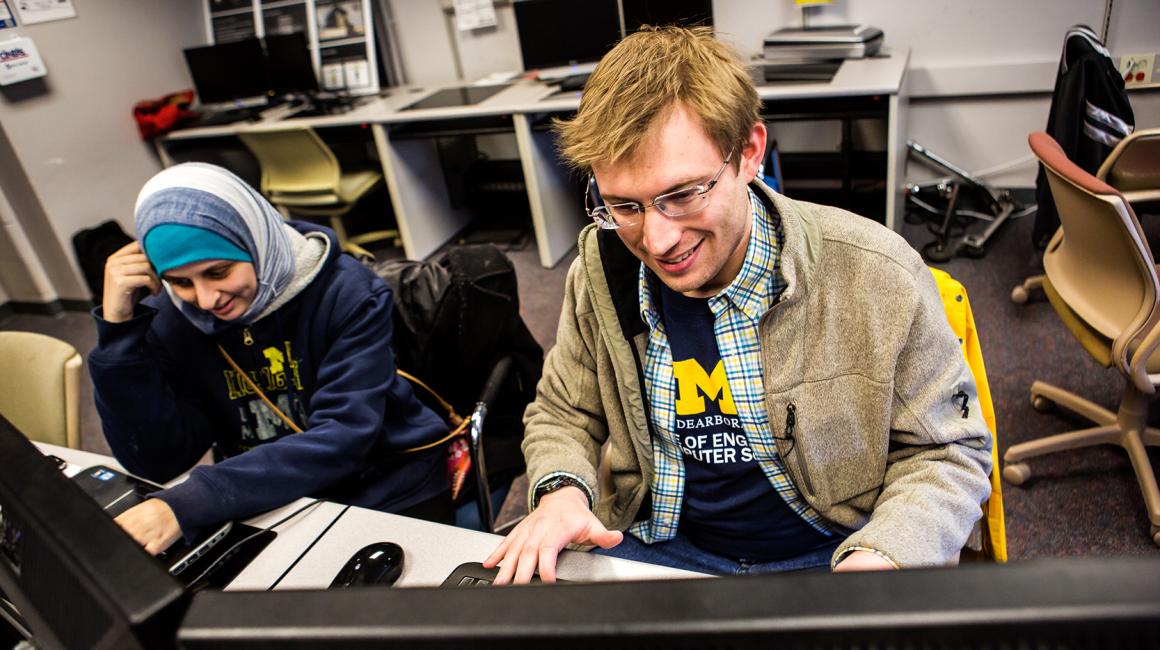
Looking ahead to Fall 2019, some big changes are in store for many of UM-Dearborn’s graduate programs. Among the most exciting: Four doctoral programs of UM-Dearborn’s College of Engineering and Computer Science now will be affiliated with UM-Ann Arbor’s Rackham Graduate School.
Associate Provost for Graduate, Global, and Digital Education Ilir Miteza explained the new partnership is all about leveraging Rackham’s extensive experience and expertise in shaping graduate education.
“Over many, many years, Rackham Graduate School has earned a reputation as one of the best graduate schools in the country — some would say the best,” Miteza said. “So as we continue to build our own doctoral programs, we think it makes a lot of sense to turn to Rackham and utilize their policies and best practices that have been so effective for educating, mentoring and supporting Ph.D. students.”
For example, one of the biggest changes is that students enrolled in the four CECS Ph.D. programs — computer and information science; electrical, electronics and computer engineering; industrial and systems engineering; and mechanical sciences and engineering —will be required to be full time and fully funded with a graduate assistantship. Miteza said that’s in part because pursuing a Ph.D. part time and without the benefit of guaranteed funding can carry big risks for students — especially in rapidly evolving fields like engineering.
“Full-time doctoral study is already a lengthy commitment — maybe five or six years,” Miteza explained. “And if a student is pursuing a degree part time, that can stretch to nine or 10 years. With the increased time comes a greater chance the student will not complete the degree. And even when they do, your courses or your dissertation are at risk of becoming irrelevant the longer you spend in a program. So policies like this help protect the best interests of students.”
Miteza said Rackham has dozens of other such practices that are designed to give Ph.D. students the best chance of success. Those include things like advising and mentoring expertise; a carefully curated lineup of professional development opportunities; policies that increase diversity in graduate programs; and best practices for supporting the mental health of doctoral students.
Another layer of support: As part of the new partnership, Rackham welcomed UM-Dearborn Computer and Information Science Professor Brahim Medjahed as a new associate dean for academic programs and initiatives. Medjahed will serve as liaison between Rackham and the Dearborn campus and oversee the implementation of the four CECS Ph.D. programs.
“As we embark on this new, exciting journey with Rackham, I’m looking forward to ensuring that our Ph.D. students, faculty and staff feel a part of the vibrant and diverse Rackham community,” Medjahed said. “I have no doubt that this collaboration will enhance the quality of doctoral education in Dearborn. We will build on Rackham’s reputation for excellence in research and graduate education to develop homegrown and high-quality Ph.D. programs at Dearborn.”
A separate set of changes impacts 18 UM-Dearborn master’s programs, mostly in CECS. These programs, which were previously part of Rackham Graduate School will now be administered by UM-Dearborn’s own graduate support systems in the colleges and the Office of the Provost. It’s a change, Miteza said, that’s something of a milestone moment for UM-Dearborn’s graduate programs.
“When Dearborn created its first graduate programs, we didn’t have a graduate school or graduate policies,” Miteza said. “So we turned to Rackham for policies and practices, and over time, we ended up with a lot of Rackham programs. Having had graduate programs in Dearborn for several decades, our faculty have accumulated expertise and crafted our own policies and practices shaping essential aspects of graduation education. So this change represents a maturation of our graduate culture here, and that’s a momentous event for us.”





